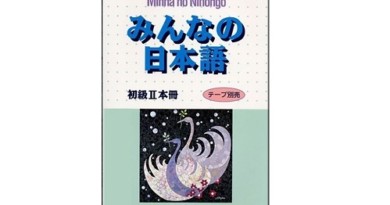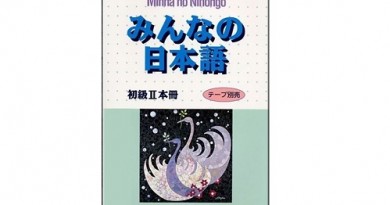Contents
- 1 Learn minna no nihongo lesson 19
- 1.1 6. Mondai
- 1.1.1 Exercise 1: Listen and answer questions
- 1.1.2 Exercise 2: Listen and choose true or false
- 1.1.3 Exercise 3: Give the true form of the verbs in the table below
- 1.1.4 Exercise 4: Fill the appropriate particle in the blank
- 1.1.5 Exercise 5: Choose the word from the box, give the true form and fill in the blank
- 1.1.6 Exercise 6: Choose the word from the box, give the true form and fill in the blank
- 1.1.7 Exercise 7: Read the following paragraph and choose true or false
- 1.1 6. Mondai
Learn minna no nihongo lesson 19
6. Mondai
To do the “Mondai” section, you need “minna no nihongo” book and audios for listening
Exercise 1: Listen and answer questions
With this exercise, you will hear the questions and answer. When listening, stop for 30 seconds to 1 minute in each sentence to write the answer. With the questions that you don’t hear clearly, listen them the second time. After listening 1 or 2 times to answer the question, you can listen again to hear each word clearly and copy it to improve your listening skill and remember words better.
1.
2.
4.
Exercise 2: Listen and choose true or false
With this exercise, the listeners will listen to the conversation, then there will be a key point about the problem that will be raised in the conversation. The listeners must choose whether the content is true or false according to what they has listened. If it is true, select 〇 (maru) and if it is false, choose ✖ (batsu). In this listening section, you should pay attention to the concluding sentence to see whether that sentence is given in a positive or negative form in order to avoid being “tricked” when listening.
1.
男:お父さんはお元気ですか。
(How is your father?)
女:ええ。父はもう81歳になりましたが、母と旅行したり、野菜を作ったりしています。
(Yeah. My father is 81 years old but he still travel with my mother and plant vegetables.)
男:そうですか。
(Really?)
女の人の両親は元気です。(The woman’s parents is very healthy .)
Answer:(〇)
2.
女:風邪はどうですか。
(How is the cold?)
男:あまり調子がよくないです。のどが痛いですから、何も食べたくないです。
(I am not feeling well. My throat hurts so I don’t want to eat anything.)
女:そうですか。病院へ行きましたか。
(Is that so. Did you go to hospital?)
男:いいえ、薬屋で薬を買いました。
(No, I bought medicine at the drugstore.)
男の人はなかなか元気になりませんから、病院へ行きました。
(Because the man didn’t get well, he went to the hospital.)
Answer:(✖)
3.
男:あのう、失礼ですが……。
(Excuse me…)
女:はい。
(Yes)
男:どこかで会ったことがありますね。
(Have we met before?)
女:えっ? (Eh?)
男:1か月ぐらいまえに飛行機で隣に座りましたね。
(I sat next to you on the plane about a month ago .)
女:ああ、そうでしたね。
(Oh, that’s right!)
女の人は男の人に会ったことがあります。
(The woman has met the man.)
Answer:(〇)
4.
女:このりんご、いくらですか。
(How much this apple?)
男:1つ180円です。
(It’s 180 yen for an apple.)
女:もう少し安くなりませんか。
(Can you give me a discount?)
男:うーん、じゃ。2つ、300円。
(Hmm. Well, how about 300 yen for 2 apples?)
女:じゃ、4つください。
(Well, 4 apples, please.)
りんごは4つで600円です。
(4 apples cost 600 yen.)
Answer:(〇)
5.
女:山田さん、富士山に登ったことがありますか。
(Mr. Yamada, have you ever climbed the Fuji mountain?)
男:ええ、1回だけあります。
(Yes, I have climbed only once.)
女:雪がありましたか。
(Was it snowing?)
男:ええ、夏でしたが、ありました。
(Yes, although it was summer, it was snowing.)
Exercise 3: Give the true form of the verbs in the table below
| 例: | 書きます | 書いた |
| 1 | 行きます | 行った |
| 2 | 働きます | 働いた |
| 3 | 泳ぎます | 泳いだ |
| 4 | 飲みます | 飲んだ |
| 5 | 遊びます | 遊んだ |
| 6 | 持ちます | 持った |
| 7 | 買います | 買った |
| 8 | 乗ります | 乗った |
| 9 | 消します | 消した |
| 10 | 食べます | 食べた |
| 11 | 寝ます | 寝た |
| 12 | 見ます | 見た |
| 13 | 降ります | 降りた |
| 14 | 散歩します | 散歩した |
| 15 | 来ます | 来た |
Exercise 4: Fill the appropriate particle in the blank
1. 沖縄へ行ったこと ( )ありますか。
2. ことし18歳 ( )なります。
3. ホテルは高いですから、友達のうち ( に )泊まります。
4. たばこは体 ( )よくないです。
Exercise 5: Choose the word from the box, give the true form and fill in the blank
1.
……ええ、一度 ( ) ことがありますから、大丈夫です。
……ええ、 ( )り、( )りしますよ。
3.
……絵を( )り、音楽を( )りすることです。
4.
Exercise 6: Choose the word from the box, give the true form and fill in the blank
1. 掃除しましたから、部屋が ( )なりました。
2. 日本は冬5時ごろ ( )なります。
3. おなかがいっぱいです。( )なりました。
4. 朝はいい天気でしたが、 午後から( )なりました。
Exercise 7: Read the following paragraph and choose true or false
Mt. Fuji is 3,776 meters high and is the highest mountain in Japan. It is located between Shizuoka Prefecture and Yamanashi Prefecture. In winter, it snows and the mountain becomes white. There is also snow on the mountain in summer. You can only climb the Mt. Fuji on July and August. There is a post office on the mountain where you can send letters and make phone calls.
In summer and autumn, in the nice morning, Mt. Fuji became red. Because it is very beautiful, Japanese people take photos and draw pictures. The picture of Mt. Fuji in red of the artist Katsushika Hokusai is very famous.
1.( ✖ )
2.( ✖ )
3.( 〇 )
Above is instruction to Learn minna no nihongo lesson 19. See other lessons in category : learn Japanese with minna no nihongo or: Japanese for beginers.


Appreciate your work. Thank you so much. I suggest update the questions for the latest edition of the minnano nihongo